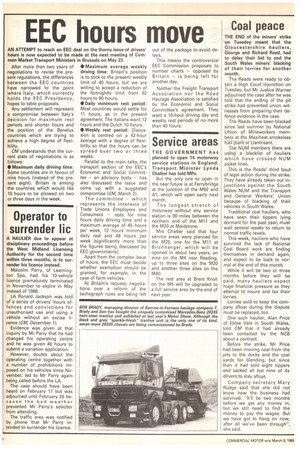EEC hours move
Page 6

If you've noticed an error in this article please click here to report it so we can fix it.
AN ATTEMPT to reach an EEC deal on the thorny issue of drivers' hours is now expected to be made at the next meeting of Common Market Transport Ministers in Brussels on May 23.
After more than two years of negotiations to revise the present regulations, the differences between the EEC countries have narrowed to the point where Italy, which currently holds the EEC Presidency, hopes to table proposals.
Any settlement will represent a compromise between Italy's decision for maximum rest periods and shorter hours and the position of the Benelux countries which are trying to achieve a high degree of flexibility.
CM understands that the current state of negotiations is as follows:
• Maximum daily driving time: Some countries are in favour of nine hours (instead of the present eight). Britain is among the countries which would like 10 hours to be allowed on two or three days in the week.
• Maximum average weekly driving time: Britain's position is to stick to the present weekly limit of 40 hours, but we are willing to accept a reduction of the fortnightly limit from 92 hours to 90 hours.
• Daily minimum rest period: Most countries would settle for 11 hours, as in the present agreement. The Italians want 12 hours and the Dutch 10 hours.
• Weekly rest period: Discussion is centred on a 42-hour average with a degree of flexibility so that the hours can be spread over two or three weeks.
Parallel to the main talks, the transport section of the EEC's Economic and Social Committee — an advisory body -has also discussed the issue and come up with a suggested compromise (CM, March 2).
The committee — which represents the interests of Trade Unions Employers and Consumers — opts for nine hours daily driving time and a maximum average of 45 hours per week, 12 hours minimum daily rest and 48 hours per week (significantly more than the figures being discussed by EEC governments).
Apart from the complex issue of hours, the EEC must decide whether exemption should be granted, for example, in the case of farm vehicles.
At Britain's request, negotiations over a reform of the tachograph rules are being left
out of the package to avoid delays.
This means the controversial EEC Commission proposals to number charts — opposed by Britain — is being left for another day.
Neither the Freight Transport Association nor the Road Haulage Association is satisfied by the Economic and Social Committee's agreement. They want a 10-hour driving day and weekly rest periods of no more than 40 hours.
















































































